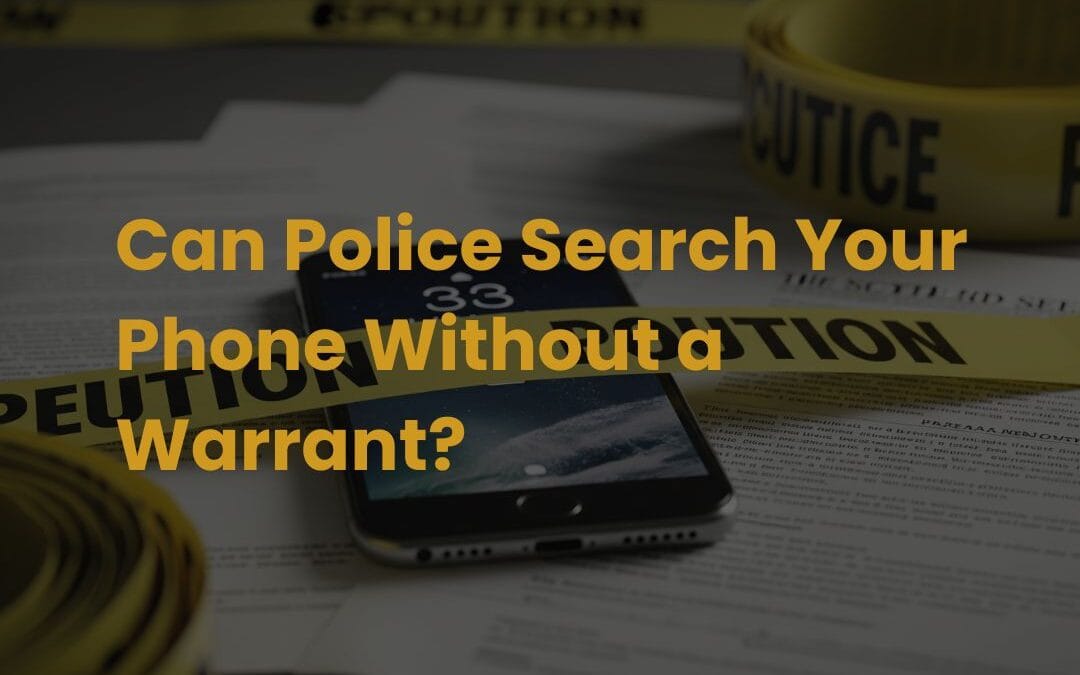In today’s digital world, smartphones contain a vast amount of personal information. From private messages to banking details, your phone holds sensitive data that law enforcement may want access to during an investigation. But can police search your phone without a warrant? The short answer is usually no, but there are exceptions. Knowing your rights can help protect your privacy and ensure law enforcement follows legal procedures.
Page Contents
The Fourth Amendment and Your Right to Privacy
The Fourth Amendment to the U.S. Constitution protects citizens from unreasonable searches and seizures. This means that in most cases, police officers need a warrant to search your property, including your phone. However, there are situations where law enforcement can bypass this requirement.
When Do Police Need a Warrant to Search Your Phone?
In 2014, the U.S. Supreme Court ruled in Riley v. California that law enforcement officers must obtain a warrant before searching a suspect’s cellphone. This landmark decision reinforced that digital privacy is as important as physical privacy.
To obtain a warrant, police must:
- Show probable cause that the phone contains evidence of a crime.
- Present a warrant application to a judge.
- Specify the scope of the search, detailing what data they are looking for.
Without a warrant, any evidence obtained from a phone search may be deemed inadmissible in court.
Exceptions: When Police Can Search Your Phone Without a Warrant
There are limited circumstances where police can access your phone without first obtaining a warrant:
1. Consent from the Owner
If you voluntarily give law enforcement permission to search your phone, they do not need a warrant. However, you have the right to refuse their request.
2. Search Incident to Arrest (Limited)
Before Riley v. California, police could search a suspect’s belongings, including their phone, upon arrest. Now, they can only inspect the physical aspects of the phone (like checking for weapons or evidence tampering) but cannot access digital content without a warrant.
3. Exigent Circumstances
If law enforcement believes an immediate search is necessary to prevent danger or destruction of evidence, they can bypass the warrant requirement. Examples include:
- Preventing an imminent terrorist attack.
- Stopping a suspect from remotely deleting crucial evidence.
- Protecting someone’s life in a kidnapping or emergency case.
4. Border Searches
At international borders, customs agents have broader authority to inspect devices, even without a warrant. The justification is national security, but travelers should be aware that their rights may be more limited at border checkpoints.
5. Probation or Parole Conditions
Individuals on probation or parole may have reduced privacy rights. Depending on the terms of their release, they may be subject to phone searches without a warrant.
How to Protect Your Phone from Unlawful Searches
Understanding your rights is the first step in protecting your digital privacy. Here are some proactive measures you can take:
1. Use Strong Password Protection
A PIN, password, or biometric security (fingerprint/face ID) can make unauthorized access more difficult. Police cannot force you to disclose a password, but in some jurisdictions, they may be able to compel biometric access.
2. Refuse Consent to a Search
Unless presented with a warrant, you have the legal right to refuse a police request to search your phone. Clearly state, “I do not consent to a search.”
3. Encrypt Your Data
Encryption adds another layer of protection, making it harder for unauthorized individuals to access your information if your phone is seized.
4. Disable Fingerprint or Face Recognition in High-Risk Situations
If you anticipate an encounter with law enforcement, switching to a PIN or password can prevent officers from using your fingerprint or facial recognition to unlock your phone.
5. Be Cautious at Border Crossings
If you’re traveling internationally, be aware that border agents may inspect your phone. Consider backing up sensitive data to the cloud and wiping non-essential information before crossing a border.
What to Do If Your Phone Is Searched Without a Warrant
If police unlawfully search your phone, take these steps:
- Stay Calm: Do not resist or obstruct law enforcement, as this could lead to additional charges.
- Invoke Your Rights: Politely state, “I do not consent to this search,” and ask if you are free to leave.
- Document the Encounter: Take note of the officers’ names, badge numbers, and any details of the search.
- Consult an Attorney: Seek legal advice as soon as possible to determine if your rights were violated and whether any evidence obtained can be challenged in court.
Legal Consequences of an Illegal Search
If law enforcement conducts an unlawful phone search, any evidence they gather may be excluded from trial under the “exclusionary rule.” This means prosecutors cannot use illegally obtained evidence against you in court. Your attorney can file a motion to suppress such evidence, potentially weakening the prosecution’s case.
Conclusion: Know Your Rights, Protect Your Privacy
Understanding when police can and cannot search your phone is essential for protecting your personal information. While there are exceptions, law enforcement generally needs a warrant to access your digital content. If you ever face an unlawful phone search, remember to remain calm, refuse consent, and contact an experienced criminal defense attorney immediately.
Need Legal Help? Contact an Expert Criminal Defense Attorney
If you believe your rights have been violated, or if you need legal advice regarding police searches, contact Hallinan Law Firm today. Our experienced attorneys are here to protect your constitutional rights. Call (415) 837-3449 now for a consultation.

